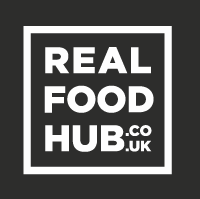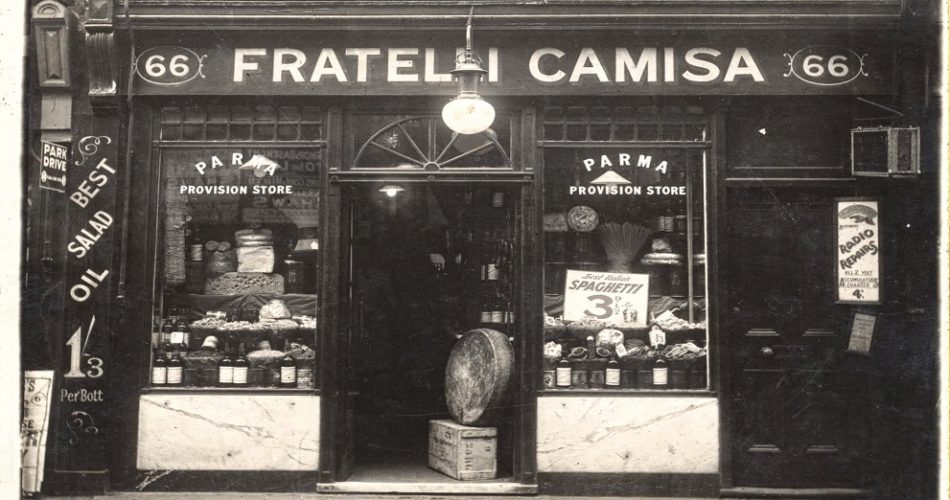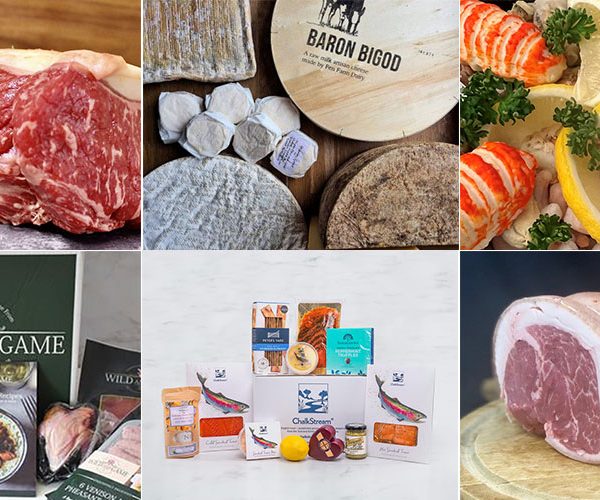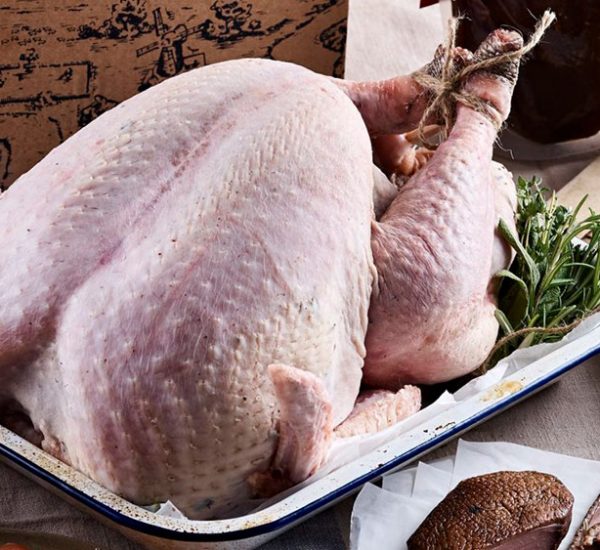By Bob Kennard

Bob Kennard established one of the first online organic meat and food websites, Graig Farm Organics in 1988, when “organic” was a fairly new term, and purchasing food online was even more unusual. Bob later established a farmers’ marketing group supplying organic cattle and lambs to supermarkets and Jenny, founder of Real Food Hub, worked for Bob to establish the group in Scotland.
Now an Agricultural Consultant and Author of ‘Much Ado About Mutton’ 2014, Bob is a contributor to Real Food Hub Blog.
(Part i) The Rise of Supermarkets
If you were a child in the ‘50s and ‘60s, you will remember that food shopping meant trapsing round several specialist shops whilst your mother chatted to the knowledgeable shop staff about what was available that week. But even by then, this way of buying food was already in decline. In March 1948 the London Co-operative Society had opened Britain’s first fully self-service store in Manor Park, East London. And this changed everything.

The massive expansion and dominance of supermarkets has had profound impacts on most aspects of our lives, sometimes positively, but certainly not always. By 2019, the traditional independent retailers made up just 5% of the entire food sector.
| 2019 Share of UK Food Market | £ bn | % |
| Supermarkets and hypermarkets | 106.3 | 54.9% |
| Convenience stores | 41.4 | 21.4% |
| Discounters | 24.5 | 12.7% |
| Online | 11.6 | 6.0% |
| Other retailers | 9.8 | 5.1% |
| total market | 193.6 |
The rise of the supermarkets had a devastating impact on the local independent specialist food shops.
Butchers – in 1950, there were 43,000 butcher’s shops in the UK; by 2019 it was nearer 6,000.
Fishmongers – In 1951 there were around 10,000 fishmongers, and today there are around 950.
Greengrocers – from 43,000 in 1950, by 2018 there were 2,500.
And, as the national economy grew, so the average proportion of household income we spent on food dwindled from 33% in 1957 to 16% in 2019, although this masks significantly higher proportions for low income families.
(Part ii) The Dangers of Supermarkets Dominating
Some may say ‘this loss of small, inefficient shops and farms is not really a problem. This is life. We no longer drive horses and carts, and some businesses always suffer when circumstances change.’ However, it is important to look at what we lose as a society when food suppliers are limited to a few large suppliers. For example:
- Cutting of link between consumers and knowledge of food production
Supermarket staff have limited knowledge of the foods they sell, when compared to the expertise developed over many years in small specialist shops supplying local produce. These food retailers are sadly not sources of information and advice for consumers. They are loathe to trumpet the nutritional or environmental benefits of one production system or food type over another.

- Food Miles.
BBC Wales highlighted food miles in a memorable item where people outside a Tesco supermarket were shown some lamb chops from a farm 20 miles away. They were asked how far they thought the meat had travelled from the farm to the shop. The correct answer was around 250 miles, due to the way the supermarkets’ processing and distribution systems work. - Lack of choice
Large retailers supply great breadth of choice, but relatively little depth. Take apples for example. Although 90% of traditional apple orchards have been lost since the 1950s, the UK still has around 2,500 native varieties of the 7,000 available worldwide. Yet of the 10 or so apple varieties which dominate the UK supermarket shelves, only 3 or 4 are British in origin. Whilst a nod is given to native varieties in “British Apples” packs, in reality this covers at most a few dozen varieties.
In the UK we have over 60 breeds of native sheep – the largest number of any country – but virtually all supermarkets sell merely ‘Standard Lamb’. To the Victorians, mutton from animals over 2 years of age was a superior meat, and yet no supermarkets sell mutton, or even 1 to 2 years old hogget. The Victorians also hotly debated where the sheep had fed and been reared, as they rightly believed that this affected the flavour of the meat, yet rarely are geographic origins disclosed on supermarket packs. The fantastic variety of eating experiences from our unique diversity of sheep meat from different ages, breeds and landscapes has been hidden from view due to the supermarkets’ concentration on ‘Standard Lamb’.

- Loss of Crop and Farm Animal Genepools
The concentration of farm production to a small range of varieties, dictated by a small group of supermarket buyers and international trade, threatens the priceless genepool of our native crops and breeds. These offer us the ability to breed crops and animals for various characteristics which may be vital in the future as climate change takes hold. We lose these genepools at our peril, but by growing and eating the plants and animals, we ensure their continued existence.

- Added value
Mass market food manufacturers and major retailers make their money from adding value to basic raw foods. These are then strongly promoted at the expense of often more nutritive but less profitable un-processed foods. We buy these foods because time for cooking and eating has been lost to other activities, and we are prepared to pay more for someone else to prepare food for us. Consumption of many over-processed foods is now known to be harmful to our health. - Loss of income to local, especially rural, economies.
Work by the New Economics Foundation[1] has shown that on a local level, economies benefit greatly from short, local food supply chains. The money tends to stay within the community and is recirculated, boosting jobs, rather than being lost to corporate processors and retailers elsewhere in the country, or overseas. - Loss of Infrastructure
As the main supermarket supply chains dominate, so we reach a critical point where the infrastructure for alternative systems of supply cease to be viable. In the 1930s there were over 30,000 abattoirs in the UK, with most towns and even villages having more than one. Today there are just 250 or so. Smaller local abattoirs are able to slaughter small numbers of animals for farmers or butchers to sell as fully traceable local meat. Over the past 10 years about 1/3rd of the remaining small abattoirs have closed. No small abattoirs mean no fully traceable local meat, and once they’re gone, that’s it.
Numbers of traditional wholesalers, including fruit and vegetables and fish, supplying the retail specialists have also dwindled rapidly and are now at critical levels, threatening alternative supply routes to those of the supermarkets. - Oligarchies
Just eight companies own the large UK red meat abattoirs supplying most of the UK’s supermarket meat. Only three are UK-based. Hence, there is just a handful of people, the supermarket category meat buyers, who buy some 80% of the meat sold in this country – this is surely a worrying situation. This excessive drive for economies of scale also applies to other foodstuffs.
These negative impacts do not apply to smaller, local producers and retailers. It is therefore important to keep both systems of food supply.
It is also important to understand how the supermarkets have become so dominant. They are superb experts in selling us their wares. They offer us easy access – free parking and handy trolleys; they supply a large range under one roof; they make the goods look attractive – and we now generally buy with our eyes. Importantly, they promote the image of ‘cheap food’ which is often a fallacy. When running my own organic meat business, we were often cheaper than supermarkets, and this is true of a range of independent food producers/retailers. What the large retailers do sell is ‘convenience’ to a public which is short of time.
(Part iii)The Fight-back
Change is afoot. In recent years we have seen a surge of interest in the story behind the food we eat. Whilst to many, food is still simply fuel (now even shamelessly sold in KFC ‘Buckets’), increasingly people want to know where their food is from, and how it was produced.

Farm shops, farmers markets, and some specialist food shops have seen strong growth, reflecting increasing interest in smaller-scale food producers, and their rich variety of produce. The UK market for retail artisanal bakery products, for example, is growing annually at 5%, when the overall bakery market has seen only a 2% increase. Significantly, mega out-of-town food stores have seen a decline in footfall, as shoppers look for smaller in-town shops, and visit them more regularly.
Awful as it is, the Coronavirus may be a pivotal moment, and leave at least one silver lining – a resurgence of independently retailed food, and a shift away from supermarkets. Evidence is mounting that local, independent and organic retailers are seeing a significant increase in demand.
- A recent study has found that as a result of the lockdown two in five Britons have chosen to use their local, independent shops and direct suppliers more often than before lockdown.
- Independent butchers have greatly benefitted from a change in consumers’ buying habits. Sales of beef, for instance, are up by 27% overall since the virus struck, compared to last year, but the figure was almost double at high street butcher shops, where sales have increased by 49%.

Farm shops have seen a huge increase in demand, and many have struggled to keep up. Some 92 per cent of farm retailers in a recent survey reported a “significant” rise in new customers since lockdown rules began in March

- Millions of British people have tried a vegetable box scheme or are buying direct from the farm, according to a YouGov survey in April 2020. The virus outbreak has changed how the public value food as an essential, according to the Royal Society for the Arts and the Food Foundation. 38% say they are cooking more from scratch and 33% (representing 17 million people) are throwing away less food. Meanwhile, 6 percent – 3 million people – have tried a veg box scheme or ordered food from a local farm for the very first time. 82% of box schemes now have waiting lists and are closed to new orders, with the average box scheme waiting list at 160. The largest box scheme has a waiting list of 6,700.
- Organic food has seen a recent surge in demand, with suppliers seeing a 25% or 30% increase.

It remains to be seen how permanent this change of shopping habits becomes, and it would not be sensible or even practical to suggest we should do away with supermarkets. They do have a useful purpose. However, we are in danger of having only supermarkets to buy food from if we, as consumers, do not also buy from local and direct-sale food producers.
The good news is that we all have the power to save the fantastic diversity of British food for future generations. We simply need to buy from local specialist retailers or direct from producers. Maybe the Coronavirus pandemic is the catalyst to permanently boost this trend. If so, it will not be a moment too soon.
© Bob Kennard August 2020.




